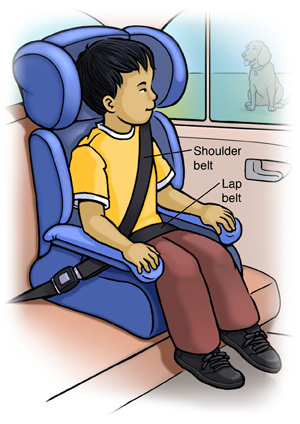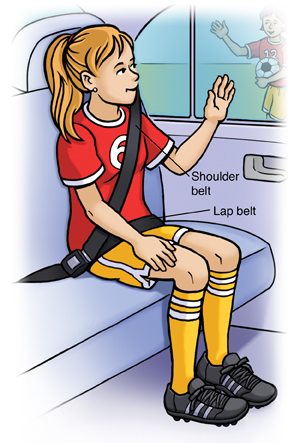A
B
C
D
E
F
G
H
I
J
K
L
M
N
O
P
Q
R
S
T
U
V
W
X
Y
Z
Click a letter to see a list of medical procedures beginning with that letter.
Click 'Back to Intro' to return to the beginning of this section.
Booster Seats and Seat Belt Safety
You’ve kept your child safe in your vehicle using a car seat—that’s great. Now your child has outgrown the seat and it’s time to upgrade. Here's how to use booster seats and seat belts to continue to keep your child safe.
Upgrading to booster seats
 |
| A child who has outgrown his or her car seat harness (typically at 40 to 80 pounds) is ready to use a booster seat. |
Children who are taller or weigh more than the limit for a forward-facing car seat should switch to a belt-positioning booster seat. This is what the American Academy of Pediatrics advises. It's important to check your car seat owner’s manual for the seat's height or weight limit. Booster seats raise up a child so the car’s seat belt fits correctly. There are 2 types of booster seats. One type has a back. The other does not. Both can be used safely. To use a booster seat safely:
-
Check that the shoulder belt lies on the shoulder or collarbone. It should not lie on the neck or throat.
-
Check that the lap belt lies flat across the hips or lap, not on the belly.
-
Use the lap belt and shoulder belt every time your child rides in the booster seat. Never put the shoulder belt under the child’s arm or behind their back. This can lead to severe internal injury.
-
Never use a booster seat if only a lap belt is available.
-
Have your child use a booster seat even when riding in someone else’s vehicle.
-
If the vehicle’s seat has no headrest, check that the booster seat has a high back. You can use a backless booster if the vehicle has a headrest. This type is often easier to switch between vehicles.
-
Let your child help choose the booster seat. This can help make them more willing to use the seat.
Upgrading to seat belts
 |
| The Safety Belt Fit Test at www.safekids.org can help you decide if your child is ready to move out of the booster seat. |
Is your child ready to move from a booster seat to using just a seat belt? In general, children who are over 4-feet-9 (usually between 8 and 12 years old) can use seat belts safely. The best way to find out if your child is ready is to use the safety belt fit test. The test helps you check if your child’s legs are long enough and if the lap belt and shoulder belt fit your child securely. For details on how to use the test, go to the Safe Kids website at www.safekids.org and search for Safety Belt Fit Test.
When using a seat belt:
-
Check that the shoulder belt lies on the shoulder or collarbone. It should not lie on the neck or throat.
-
Check that the lap belt lies across the hips or lap, not on the belly.
-
Your child's knees should bend over the edge of the seat.
-
Check that your child is comfortable in this seating position for the whole trip.
-
Children under the age of 13 should sit in the back seat.
Teaching your child to be safe
As your child gets older and rides in cars with other drivers, it is even more important for them to understand car safety rules. To keep your child safe:
-
Explain to your child that a booster seat or seat belt will help keep them safe in a car crash.
-
Check that your child understands that they must use a booster seat or seat belt in every vehicle, every time. No exceptions.
-
Teach your child how to buckle up in the car.
-
Have older children help set an example for younger kids by buckling up.
-
Don’t forget that your child learns by watching adults, so use your seat belt every time.
Online Medical Reviewer:
Amy Finke RN BSN
Online Medical Reviewer:
Dan Brennan MD
Online Medical Reviewer:
Rita Sather RN
Date Last Reviewed:
9/1/2024
© 2000-2024 The StayWell Company, LLC. All rights reserved. This information is not intended as a substitute for professional medical care. Always follow your healthcare professional's instructions.